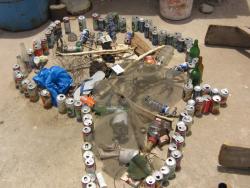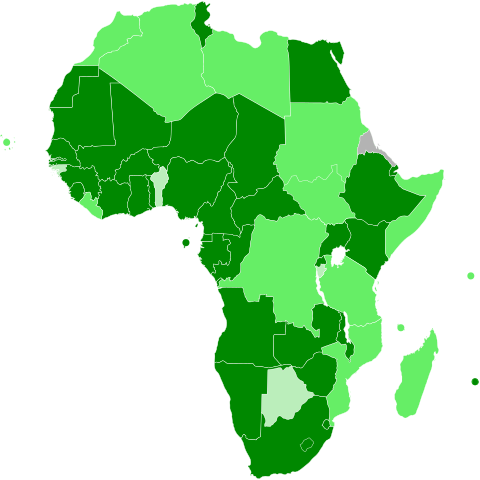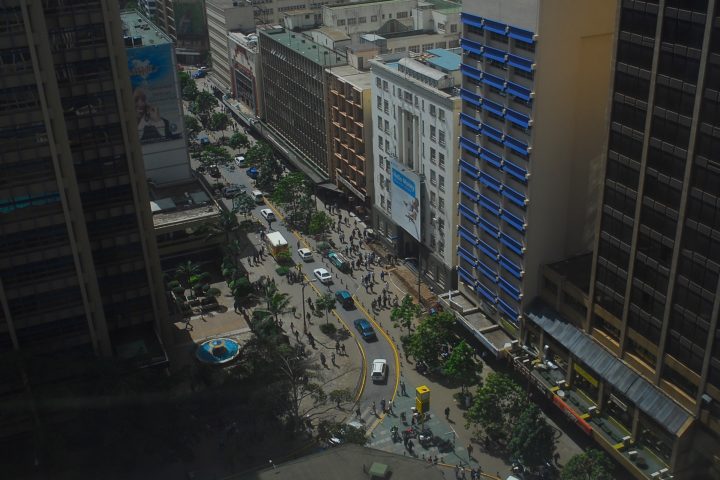“Africa in the face of waste management” ephemeral work of art, anonymous, 2010.
Among the evils that affect the global ecosystem and from which the African environment is no exception, the overexploitation of resources leading to deforestation, pollution of rivers, air and soil, all accompanied by the rapid and large-scale disappearance of wildlife through the destruction of its natural habitat, immediately come to mind.
However, it is not these aspects of ecosystem problems that we will focus on in this article. Rather, our objective is to focus on pollution phenomena that are particularly visible on a daily basis, affecting in particular cities, new faces of Africa and now home to the majority of Africans, attracting ever more inhabitants[1].
Visible, obvious evils, yet everyone looks away, often pretending to ignore their existence and extent while crossing them along the pavements.
Two major pollution factors can be identified in African cities: on the one hand, air pollution linked mainly to the exhaust fumes from vehicles that travel along overcrowded arteries, and on the other hand, material waste that often litters these same arteries due to the lack of an adequate waste treatment system.
It is on the treatment of this waste that we will take a close look here; how are the bins of African households emptied?
In 2012, the world’s cities generated 1.3 billion tonnes of waste according to World Bank figures[2], and given the massive urbanisation phenomenon that accompanies the population explosion, this figure is estimated at 2.2 billion in 2025, as reflected in the large summer series of articles in the newspaper Le Monde[3] which highlighted and described this phenomenon throughout the continent, as well as the dossier “Urbanism: roots and cities” by Jeune Afrique[4], which focused mainly on the Maghreb.
Insufficient urban environmental policies
While many studies warn of the dramatic effects of the omnipresence of waste on the health of the population in urban areas, the accumulation of litter in the street remains a recurrent phenomenon, particularly in sub-Saharan Africa, and has been so for several decades.
It can be observed in Conakry as well as in Abidjan, Douala or Kinshasa. It reflects both a real weakness in hygiene policies and a lack of public awareness of environmental and health issues. Without the collection of household waste and areas dedicated to its treatment or even its simple storage, bins pile up on the ground in the streets of African cities, and are burned in total anarchy when the volume, smell and presence of animals they attract become unbearable for residents.
Studies conducted on the behaviour of residents of various African cities show harmful environmental and health habits, revealing a cruel lack of awareness among the population of the dangers that these uses entail. The results of these studies show that the majority of individuals deposit their garbage in open dumps, burn it, or throw it into gutters. The compost principle is only 5th among the methods used[5].
This lack of public awareness combined with the weakness of public authorities in urban waste management is such that fatal accidents sometimes occur, as was the case in 2016 in Cotonou (Benin) where a major explosion[6] killed some 20 people in an open dump that was clearly not sufficiently regulated. Even more recently, in March 2017, a landslide occurred in the saturated Koshe landfill in Adis Ababa, Ethiopia, resulting in an extremely heavy toll of 130 deaths, including entire families living in the very heart of this mountain of waste[7].
These events, in addition to the primary consequences of the presence of garbage on the health of their citizens, shed a harsh light on the dramatic failures of the authorities to uphold the three fundamental components of public order, namely safety, tranquility and health, towards their citizens.
The first cause of this phenomenon is the frequent lack of an adequate public waste treatment system at the city level. Public vehicle fleets for household waste collection are often insufficient and sometimes obsolete or inadequate, while landfill, recycling or incineration infrastructures often combine at least two of these three defects, when they have at least the merit of existing.
Plastic, an enemy of the environment and a crying city
While European States are making efforts in the use of plastics by gradually introducing legislation limiting packaging and the use of plastic bags in supermarkets, African positions are also changing in this area.
In the fight against non-recyclable plastics, Rwanda is a pioneer, thanks in particular to the cleanliness policies put in place by Paul Kagame, which have borne fruit. Indeed, since 2008, the import, use and trade of non-biodegradable and non-reusable plastic bags has been strictly prohibited by law and any obstruction of the law may result in a prison sentence. The environmental policy is pushed to such an extent that the plastic bags of incoming Rwandans on Rwandan soil by air are confiscated on arrival at the airport and exchanged for paper bags and reusable containers[8]. Since August 2017, Kenya has followed Rwanda’s lead, already followed by South Africa, Senegal and Côte d’Ivoire in particular[9]. Neighbouring Burundi has recently committed itself to ban non-biodegradable plastic bags by 2020[10], as has Benin since June 27, 2018.
Another key measure of the Rwandan government’s plan, which aims to be a pioneer in this field, is the heavy fines imposed on anyone who throws garbage on the streets. While this system, which has been in place for 10 years now, may seem symbolic, it is clear that it is effective, since the Rwandan capital has in recent years been considered the cleanest in Africa.

AMRANI Younes, Kigali Centre, April 2017.
Turning mountains of garbage into a gold mine: the challenge of waste recycling driven by the cries of alarm from civil society.
The principle of waste recycling, which is lucrative, appears to be a possible solution to the waste flows flooding the arteries of African urban areas, despite (too) rare exceptions such as Kigali. This principle also represents a new area of investment for private funds and opens up a new wave of atypical but flourishing activities, on which some companies are already surfing.
Indeed, while African States often cannot afford massive investments of public funds in the construction of new infrastructure, given the chronic economic difficulties faced by many of them, investors and entrepreneurs can more easily mobilize capital to develop this sector of activity, which is the recovery of waste, i.e. its treatment and transformation into materials, miscellaneous objects or energy to benefit from it, according to the famous Lavoisier adage; “nothing is lost, nothing is created, everything is transformed”.
The Ghanaian government issued a call for investment in 2017 in the field of waste management and treatment[11] with a view to improving the country’s health status following a warning call from a coalition of NGOs, all of which specialize in promoting hygiene and combating soil and water pollution[12].
In Nigeria, on the outskirts of the city of Calabar, to avoid massive direct government investment, the now widespread model of public-private partnership was favoured in the construction of a waste recycling centre[13]. This agreement, signed between the Nigerian government and the Italian firm Management Environmental Finance, should directly and indirectly generate more than 2000 jobs. The company is responsible for the construction of the entire infrastructure and its operation, bearing the costs and reaping the benefits, while the State simply makes available the land on which it is located.
The importance of the voice of civil society organizations and individuals as whistleblowers and vectors for the development of new public policies in response to urgent needs should be acknowledged here. Just like the advocacy work carried out by these non-governmental organisations with the authorities in 2015, when Forbes magazine placed 16 African cities among the 25 dirtiest in the world, scandalized calls had also been made from social networks to denounce this recurrent insalubrity, and are still used, notably through the hashtag #Selfiedechets on Twitter[14] relayed by a number of ecology activists such as Chérif Fatoumata, recently featured in a France 24 report on this subject[15].
Green start-ups: the green economy as an entrepreneurial springboard
In addition to these industrial-scale projects and with a substantial budget, smaller but at least as promising initiatives have been launched in the most populous city of the Nigerian demographic giant, Lagos, where only 40% of the waste produced is collected. Bilikiss Adebiyi-Abiola, a 36-year-old engineer from the Nigerian diaspora in the United States, has created a booming start-up, Wecyclers[16], with 120 employees who ride their trailers through the streets of Lagos to collect waste from private individuals, at their request, and sort, decontaminate and compact it[17].
Local residents can use their services by simply registering online or via SMS and get rid of their garbage for free, with Wecyclers making a profit by reselling the recycled waste as material.
Other interesting initiatives have been observed in the heart of a state neighbouring Nigeria, Cameroon. This is particularly the case with the work of Pierre Kassouloum, a local entrepreneur who surrounded himself with young reintegration workers – former street children – who set up a process that he refined over the years before creating his company, CAREDD.
The plastic that CAREDD recovers is sorted in such a way that only materials that do not release toxic fumes when melted are kept. During the melting process, it is mixed with sand to give it more consistency and strength; the mixture is then poured into paving stone moulds.
The 5cm thick paving stones then created are then resold at 3500 CFA francs (where a traditional cement paving stone is traded at 5000 CFA francs), providing a real ecological alternative in the Cameroonian construction economy if the project were to grow. CAREDD has employed 15 people since its creation in 2008 and has been training around 20 young people since 2015 thanks to the support of the Cœur Afrique association and the famous Cameroonian international footballer Roger Milla. The concept of recycled plastic paving stones could therefore have as much impact on people’s minds as the former centre-forward who now supports them, combining social development with eco-responsible efforts.
A greener future for Africa
Examples of start-ups as well as companies on an industrial scale are multiplying in both French-speaking and English-speaking African States, whose policies are gradually harmonizing. These, combined with drastic environmental policies such as those found in Rwanda and gradually throughout Africa, give hope for a greener future for the continent’s cities. The Africa of tomorrow could become a real pioneer in the field of waste recovery, constituting an economic and ecological lung if efforts and investments were to continue.
Nicolas Klingelschmitt
[1] “By 2050, more than a billion Africans will be urban dwellers, compared to 400 million today and 20 million in 1950”
http://www.jeuneafrique.com/189107/politique/villes-africaines-l-urbanisation-un-d-fi-pour-l-avenir/
[2] http://www.worldbank.org/en/topic/urbandevelopment/brief/solid-waste-management
[3] “Africa in cities, our summer series in 28 episodes, 15 reporters and 10,000 km To tell the story of a continent that is urbanizing at high speed, Le Monde Afrique takes you on a journey from Kinshasa, to the heart of the continent, to Tangier, to the gates of Europe.”
[4] “Dossier Urbanisme: roots and cities. Fascinating or worrying, the continent’s metropolises are one of its main drivers of development”
http://www.jeuneafrique.com/dossiers/urbanisme-des-racines-et-des-villes/
[5] SAMSON AKPAN Patience Edoho, ” Solid Waste management in Calabar, Cross River State ” Department of Nursing Science, University of Calabar, Cross River State, Nigeria. Page 15. Statistics from Table 3 : “Respondents’ method of solid waste management in Calabar, Cross River State ” September 2009.
[6] “About twenty dead and dozens wounded. (…) A local company had come to dump rotten wheat flour and sprayed it with gasoline before setting it on fire, a police spokesman explained. A witness then recounted how the population threw themselves into areas of the landfill that were not burning to obtain flour when an explosion occurred.” http://geopolis.francetvinfo.fr/dechets-urbains-une-gestion-laxiste-qui-fait-des-ravages-en-afrique-118333
[7] http://www.lemonde.fr/afrique/article/2017/07/27/en-ethiopie-la-decharge-d-addis-abeba-au-c-ur-d-enjeux-politiques-et-fonciers_5165721_3212.html
[8] http://www.france24.com/fr/20130411-element-terre-le-rwanda-un-pays-sans-sacs-plastiques-interdiction-plastique-afrique-environnement
[9] http://www.lemonde.fr/afrique/article/2017/08/28/pour-lutter-contre-la-pollution-le-kenya-bannit-les-sacs-en-plastique_5177680_3212.html
[10] https://www.sciencesetavenir.fr/nature-environnement/developpement-durable/le-burundi-a-decide-d-interdire-les-sacs-plastiques-non-biodegradables-des-2020_126731
[11]http://afrique.lepoint.fr/economie/traitement-des-dechets-le-ghana-retrouve-de-l-ambition-25-08-2017-2152141_2258.php
[12] http://citifmonline.com/2017/03/03/govt-urged-to-invest-more-in-waste-management/
[13] https://afrique.latribune.fr/entreprises/industrie/energie-environnement/2017-05-16/nigeria-une-prochaine-usine-de-recyclage-de-dechets-a-cross-river-714838.html
[14]http://www.liberation.fr/planete/2017/02/08/en-afrique-le-selfie-s-attaque-aux-tas-d-ordures_1547226
[15] Reportage : http://observers.france24.com/fr/20171205-ligne-directe-selfies-dechets-une-guinee-propre .
[16] http://wecyclers.com/services/
[17] http://www.jeuneafrique.com/508289/societe/nigeria-wecyclers-la-start-up-qui-transforme-les-dechets-en-revenus/




